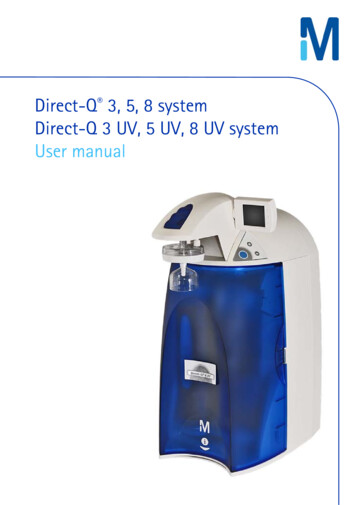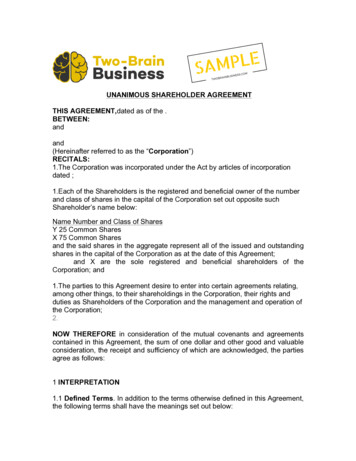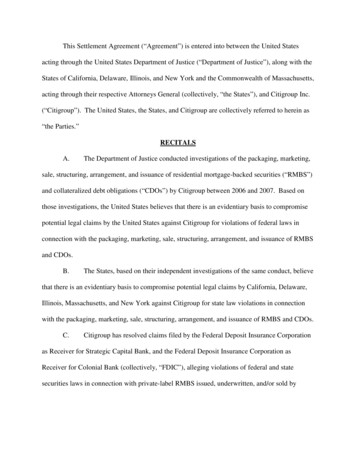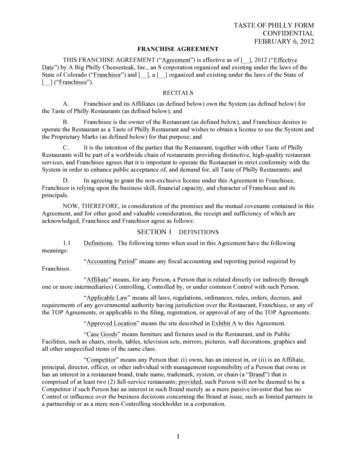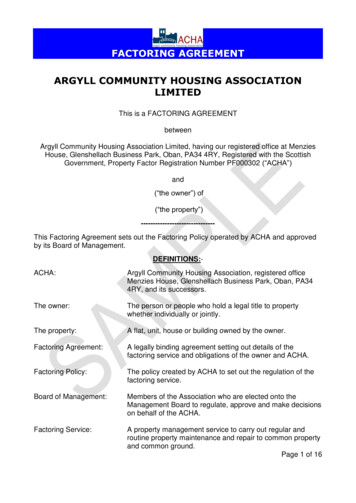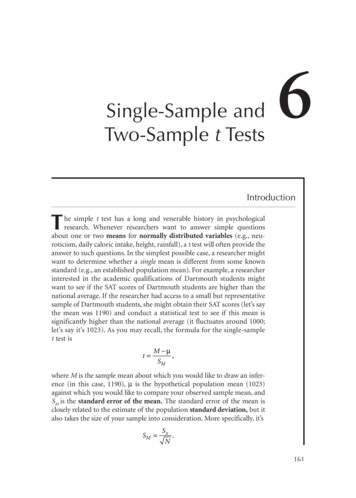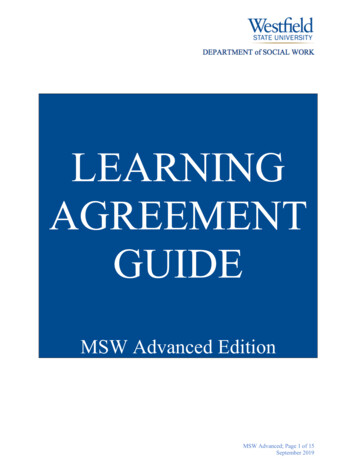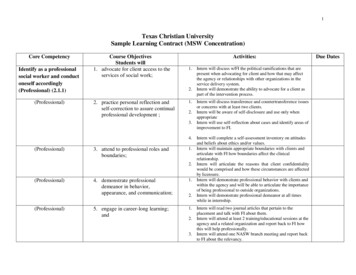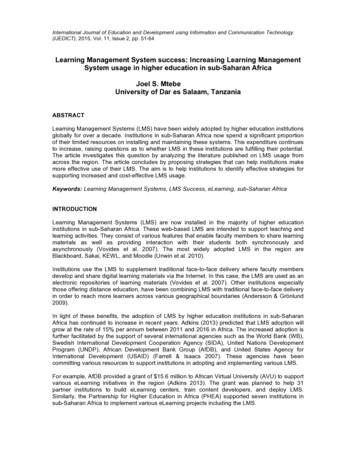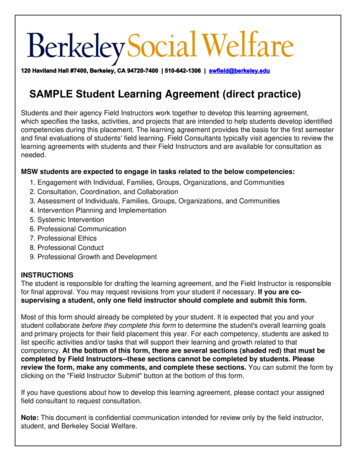
Transcription
120 Haviland Hall #7400, Berkeley, CA 94720-7400 510-642-1306 swfield@berkeley.eduSAMPLE Student Learning Agreement (direct practice)Students and their agency Field Instructors work together to develop this learning agreement,which specifies the tasks, activities, and projects that are intended to help students develop identifiedcompetencies during this placement. The learning agreement provides the basis for the first semesterand final evaluations of students' field learning. Field Consultants typically visit agencies to review thelearning agreements with students and their Field Instructors and are available for consultation asneeded.MSW students are expected to engage in tasks related to the below competencies:1. Engagement with Individual, Families, Groups, Organizations, and Communities2. Consultation, Coordination, and Collaboration3. Assessment of Individuals, Families, Groups, Organizations, and Communities4. Intervention Planning and Implementation5. Systemic Intervention6. Professional Communication7. Professional Ethics8. Professional Conduct9. Professional Growth and DevelopmentINSTRUCTIONSThe student is responsible for drafting the learning agreement, and the Field Instructor is responsiblefor final approval. You may request revisions from your student if necessary. If you are cosupervising a student, only one field instructor should complete and submit this form.Most of this form should already be completed by your student. It is expected that you and yourstudent collaborate before they complete this form to determine the student's overall learning goalsand primary projects for their field placement this year. For each competency, students are asked tolist specific activities and/or tasks that will support their learning and growth related to thatcompetency. At the bottom of this form, there are several sections (shaded red) that must becompleted by Field Instructors--these sections cannot be completed by students. Pleasereview the form, make any comments, and complete these sections. You can submit the form byclicking on the "Field Instructor Submit" button at the bottom of this form.If you have questions about how to develop this learning agreement, please contact your assignedfield consultant to request consultation.Note: This document is confidential communication intended for review only by the field instructor,student, and Berkeley Social Welfare.
Student InformationFirst NameHermionePreferred NameHermeLast NameGrangerLocal Address (please update if blank or incorrect)AddressHogwarts CastleAddress 2120 Haviland HallCityBerkeleyStateCA - CaliforniaZip Code94707CountryUnited StatesField Placement and InstructionAgency NameNote: This is for reference only. Make changes orupdates in the space to the right.If your Agency or Agency Name has changed,please update it here.County District Attorney's Office, Victim Services UnitTEST-Harry Potter UniversePrimary Field InstructorJanet Nunez, LCSWSecondary Field Instructor Name (if applicable)James Washington, MSWField Placement SchedulePlease indicate the start andend DATE for this placement.Start DateEnd Date9/26/20185/2/2019
Please indicate the start and end 8:30 AMTIME for each field placementday.5:00 PMThis field placement will occurYeson standard days: Wednesdaysand Thursdays.If other schedule, pleasedescribe here.Designated SupervisionName of Person providingSupervisionStudent is encouraged to attendstaff meetings on Tuesdays, whenpossible.Day and TimeThursday 10-11 amJanet Nunez, LCSWPlacement Overall Learning Goals and ProjectsPlease describe your primary learning goals forthis placement.My primary goals at this placement:1. To understand the immediate psychosocial impactthat violent crime has upon victims and their families;2. To learn how the police and District Attorney'soffices work and to be an effective member of criminaljustice teams;3. To provide effective psychosocial support andadvocacy to victims of crime as they consider orpursue criminal prosecution;4. To consider the kinds of psychosocial supportoutside of the legal system that victims of crime needto enhance their development over the life course.
Please describe the projects and activities (thatyou and your field instructor identified for you towork on) that support your learning goals.Primary assignments include:1. 4-hour drop-in shift, providing triage and crisisintervention to victims of crime;2. Carrying a diverse caseload of 4-8 victims ofviolent crime and providing assessment, safetyplanning, supportive counseling, criminal justiceadvocacy, court accompaniment, case managementto community resources, and referrals topsychotherapy;3. Working effectively with police investigators, districtattorneys, and eligibility workers for the victimscompensation fund to serve victims of violent crime;4. Developing and implementing a follow-up protocolto check in with victims of crime 6-12 months afterservices were rendered to reassess psychosocial wellbeing and offer additional support.1. ENGAGEMENT WITH INDIVIDUAL, FAMILIES, GROUPS, ORGANIZATIONS,AND COMMUNITIES: Establishes contact, builds rapport, forms working relationships, andinvites a diverse array of clients and/or constituents to participate in clinical services and/oradministrative projects.Please describe specific tasks, activities, and projects related to this competency below.During the drop-in shift, the primary task will be to engage new clients who have dropped in for service and toconduct follow-up calls to clients who have not contacted the office but appear to be in a high risk category.These clients are primarily adults and come from diverse communities and walks of life with many of thembeing immigrants who may not be familiar with how criminal justice systems work in this country and may beconcerned about deportation. Since all of the clients have experienced a crime, a trauma-informed approachto engagement will be critical. For clients that are too afraid to leave their homes, we sometimes arrange ahome visit to them, and the student will conduct 1-2 of these per semester.2. CONSULTATION, COORDINATION, AND COLLABORATION: Obtains informationfrom a variety of collaterals, constituents, and/or other formal or informal sources; Integrates collateralinformation into an effective and coordinated service and/or project plan.Please describe specific tasks, activities, and projects related to this competency below.In this position, the primary consultation, coordination, and collaboration is with police investigators on theclients' cases and then, eventually, the prosecutor, particularly if charges are brought, and sometimes theclaims specialist who processes the victim compensation applications. In addition, many clients areaccompanied to court or the office by their partners, spouses, and family members, often who have their ownreactions and concerns related to the crime that may or may not match the client's. In addition to the clients,all of these contacts must also be engaged in a professional working relationship.3. ASSESSMENT OF INDIVIDUALS, FAMILIES, GROUPS, ORGANIZATIONS, ANDCOMMUNITIES: Collects, analyzes, and applies relevant information and develops relevant, wellformed goals to guide the effective delivery of clinical services and/or the effective execution of
administrative and planning projects.Please describe specific tasks, activities, and projects related to this competency below.Assessment primarily consists of completing a 4-page psychosocial assessment form adapted from the AdultNeeds and Strengths Assessment (ANSA). In addition, a detailed assessment of client safety related tosuicidality and re-victimization from the alleged perpetrator are completed with special protocols for victims ofintimate partner violence and stalking.4. INTERVENTION PLANNING AND IMPLEMENTATION: Selects intervention methods tosupport goal acquisition based upon assessment, the best available evidence and/or knowledge, andclient or constituent preferences. Evaluates and modifies implementation so as to maximize thelikelihood of reaching the intended outcome(s).Please describe specific tasks, activities, and projects related to this competency below.The agency's intervention approach is centered around crisis intervention and safety planning, providing clearlegal information to the clients and letting them know what rights they have, supporting and advocating themduring all criminal justice proceedings, and making referrals to meet other basic needs and psychosocialneeds that may have pre-dated or be directly related to their criminal victimization. When preparing a victim totestify in court, cognitive-behavioral and skills oriented approaches are often employed to increase theirconfidence. The student will obtain 4-8 ongoing clients from the drop-in shift.5. SYSTEMIC INTERVENTION: Demonstrates interest, understanding, and/or effectiveparticipation in the organizational, institutional, policy, and/or community contexts for the purpose ofimproving the delivery of social work services to vulnerable populations.Please describe specific tasks, activities, and projects related to this competency below.The student will engage in protocol development related to a 6 or 12-month follow-up to clients of violent crimeafter their contact with the Victim Services Unit has included. In a recent focus group of former clients, theyreported that they would have benefited from more psychological intervention 6-12 months after the courtcase had concluded. This protocol will help the agency improve its services to clients over a longer recoveryperiod. The protocol should be based in evidence (a literature review, review of best practices, review of whatother programs do that shows promise), should prioritize the most at-risk clients, and should be able to beadministered feasibly.6. PROFESSIONAL COMMUNICATION: Communicates verbally and in writing in anorganized, complete, appropriate, and timely manner. Delivers communication in an effective mannergiven its purpose and context.Please describe specific ways in which you plan to participate in, employ, and/or strengthen thiscompetency below.It is important to keep impeccable records of client contacts on the agency's data base system and to write abrief note following each substantial contact with each client. Use of logic, concision, and descriptivelanguage free of bias is essential because of the legal nature of our work.Communication with police investigators and district attorneys can be challenging because they are often sobusy they are unresponsive. New staff often struggle with balancing being collegial and collaborative withalso being appropriately assertive. The student will practice adopting effective communication approacheswith these colleagues during this internship.7. PROFESSIONAL ETHICS:Considers and applies the professional code of ethics for social workers so as to recognize ethicalconflicts and arrive at principled decisions.Please describe specific ways in which you plan to participate in, employ, and/or strengthen this
competency below.There are often conflicts between what a victim wants and what might be in his/her/their best interest, how thepolice and /or prosecutor are proceeding (or not proceeding), and what the advocate thinks should happen.The conflicting pressures in this role are important to recognize and bring to field instruction.In addition, strong emotional reactions to the work are common and can lead to subtle forms of victim-blamingor to promising clients something that can't be delivered, both of which the student should remain cognizantof.8. PROFESSIONAL CONDUCT:Demonstrates professional behavior, appearance, and communication in accordance with standardsidentified by the school, agency, community, and profession.Please describe specific ways in which you plan to participate in, employ, and/or strengthen thiscompetency below.Since this is a district attorney's office, we expect all personnel to be on time and to have excellentattendance. The dress code is more formal in our office and can best be represented by "business casual."Communication with colleagues typically needs to be cordial, concise, and formal. Exercising great discretionand exceptional judgment is particularly important, given the weight of our office.9. PROFESSIONAL GROWTH AND DEVELOPMENT:Takes responsibility for learning and demonstrates initiative. Receives, considers, and integratesfeedback from instructors. Demonstrates commitment to continual professional development, life-longlearning, and leadership development.Please describe specific ways in which you plan to participate in, employ, and/or strengthen thiscompetency below.Student will bring an agenda to field instruction each week.Student will be expected to demonstrate initiative for his/her/their own learning and to approach colleagues forconsultation when field instructor is occupied while also respecting their time.Student will be asked to reflect on cultural and diversity factors, ethical conflicts, and strong personal reactionsto certain clients, colleagues, and/or legal outcomes.The student can be expected to receive direct feedback on strengths and also on how to improve.Because this placement involves exposure to high volume and high intensity related to trauma, recognizingvicarious trauma and building a strong, flexible coping repertoire are essential and worth periodic discussion.DELIVERABLES AND FEEDBACKBased on the above learning goals, projects, and activities, please list 2-3 deliverables (that you andyour Field Instructor have discussed) that are realistic for you to complete during this placement.1. Written documentation of client interactions2. Written protocol on 6-12 month follow-upOther examples: handout developed for clients; group curriculum (developed or revised); case conferenceoutlines and/or note etc.
Each student and Field Instructor are also asked to identify at least two activities upon whichfeedback will be given based on direct observation, audiovisual observation, or transcription/processrecording review of the students work.Please describe the activities and the plan to give/get feedback (please collaborate with your FieldInstructor to develop the plan).1. 20-minute observation of student on drop-in shift to observe engagement, assessment, and interventionskills and provide feedback related to strengths and areas of improvement;2. 30-minute observation of student preparing a client for court proceedings and to provide feedback related tostrengths and areas of improvement; and3. Observation of a conference between a police investigator and/or prosecutor and victim where intern isserving in an advocate and case management role.OVERALL COMMENTSSTUDENT COMMENTSFIELD INSTRUCTORCOMMENTSFIELD CONSULTANTCOMMENTSIf possible, I'd like the case to be the lead advocate ona case that is going to trial during the secondsemester of my internship. In general, I'd like to beassigned cases of persons from underrepresentedethnic groups so I can expand my culturalcompetence. Since field instruction is really importantto me, I am also asking that our field instruction timeoccur regularly so I can maximize my learning and mycontributions to the office.The student should be able to make a substantialcontribution to our unit; the development of the followup protocol is a particular need we have and one wayfor her to have a lasting impact on victim servicesdelivered from our office.I also would love to see a copy of the final protocoland look forward to my visit.REQUIRED AGREEMENTS (to be completed by the Field Instructor)The Agency and Field Instructor agree to provide the following to the intern. Please read and checkboxes to indicate agreement.YesOne month orientation to the agency mission,program operation, roles, and expectationsYesOrientation to safety and risk reduction policiesand procedures
Adequate work spaceYesYesAccess to computer, telecommunications, and allequipment needed to perform tasksYesAccess to task assignments to promote advancedcompetency progression in identified areasYesA minimum of one hour per week of dedicatedfield instructionYesDesignated back-up supervision and coveragewhen unavailableYesFeedback based upon direct observation ordesignated recording methodYesTimely, direct communication to student and FieldConsultant when concerns ariseYesTimely, thorough submission of evaluationdocuments at the end of each semesterOPTIONAL AGREEMENTS (to be completed by the Field Instructor)The Agency and/or Field Instructor also agree to provide the following (if applicable):StipendYesAmount 4,000, disbursed monthlyWork-StudyAmountTravel ReimbursementPlease describeNoNoYesUse of Agency CarPlease describeNote: Students are not allowed Student may sign out county car, ifto transport clients in theirneeded.personal vehicles.Other ResourcesNoFORM SUBMISSIONPlease describe
This is an e-signature form. By clicking on the appropriate submit button below, you are indicatingthat you have read this document and have not altered any sections authored by another party. As areminder, this document contains confidential communication intended for review only by the fieldinstructor, student, and the School of Social Welfare and is intended to be used solely for educationalpurposes.Actioned by Greg Merrill on 8/16/2018 6:29 PM (Pacific Daylight Time)Actioned by Greg Merrill on 8/16/2018 6:29 PM (Pacific Daylight Time)Actioned by Greg Merrill on 8/16/2018 6:30 PM (Pacific Daylight Time)
learning agreements with students and their Field Instructors and are available for consultation as needed. MSW students are expected to engage in tasks related to the below competencies: 1. Engagement with Individual, Families, Groups, Organizations, and Com
